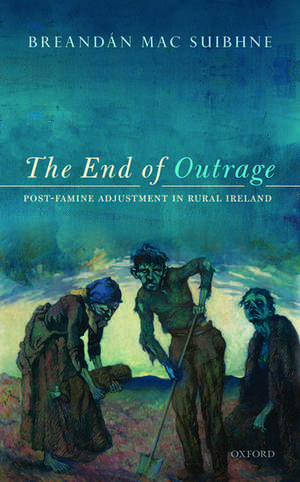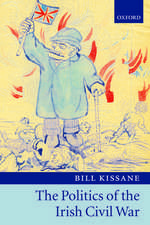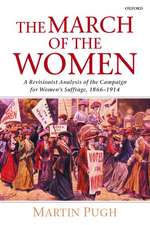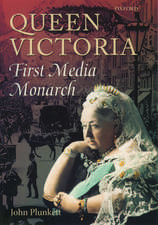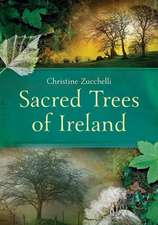The End of Outrage: Post-Famine Adjustment in Rural Ireland
Autor Breandán Mac Suibhneen Limba Engleză Hardback – 17 aug 2017
Preț: 225.79 lei
Preț vechi: 243.22 lei
-7% Nou
Puncte Express: 339
Preț estimativ în valută:
43.20€ • 45.11$ • 35.76£
43.20€ • 45.11$ • 35.76£
Carte tipărită la comandă
Livrare economică 24-31 martie
Livrare express 28 februarie-06 martie pentru 49.03 lei
Preluare comenzi: 021 569.72.76
Specificații
ISBN-13: 9780198738619
ISBN-10: 0198738617
Pagini: 338
Dimensiuni: 151 x 223 x 25 mm
Greutate: 0.56 kg
Editura: OUP OXFORD
Colecția OUP Oxford
Locul publicării:Oxford, United Kingdom
ISBN-10: 0198738617
Pagini: 338
Dimensiuni: 151 x 223 x 25 mm
Greutate: 0.56 kg
Editura: OUP OXFORD
Colecția OUP Oxford
Locul publicării:Oxford, United Kingdom
Recenzii
Mac Suibhne's superb account brings us face to face with subaltern nineteenthcentury rural Ireland.
... a sweeping historical tale ...Mac Suibhne paints an evocative canvas of clashing tribes and morally opaque characters. ...a historical companion to understanding the Irish Catholic experience not only in Donegal, but also in northeastern Pennsylvania.
Mac Suibhne provides an insight not only into Beagh during the famine but also into the later troubles in Beagh: clearances, land-grabbing and informing ... Mac Suibhne has reminded us of the importance of the way that the response to local events can illuminate a moment in a country's history.
For Mac Suibhne nothing is simple; no one is purely victim or villain; the dominant colour is not green or orange but grey. There are dramatic events and extraordinary characters ... Through it all there is imagination, a commitment to showing people as "more than shadows cold and wan" ... It is impossible not to be moved by the humanity with which Mac Suibhne writes of his ancestors and their neighbours, or to be provoked by his unconventional epic. From a local row he has crafted an extraordinary work of history that makes its own importance.
Breándan Mac Suibhne has provided us with a remarkable new history in his new book The End of Outrage ... he not only tells that story of integration into the market order, but of, in his words, the end of moral indignation in the face of despair and disaster, and of the fate of rural poor -- for it is from those families that the casualties of the famine came. It vividly describes a process of marginalisation, of the consolidation of holdings on the eve of the Famine, the extinguishing of commonage -- all facilitated by the instruments of a new technology of the state, the ordnance survey.
The End of Outrage is a remarkable book ... The reader of this book is from the outset captured and captivated by its bivalve nature as both a local and personal memoir, as an historical record and a meditation on generational change.
a minute and exacting analysis of one very small place in Southwest Donegal becomes a rumination on how the living rub along with the dead, how forgetting happens and how outrage (grudges, feuding, revenge, violence) ends. It is an extraordinary act of recovery and is set to become a classic of Irish historiography ... [a] marvelous book
[a] remarkable book ... Mac Suibhne's forensic interrogation of local 'memory' -- scrupulously avoiding verdicts, vindications or sentimentality -- is a masterclass in assessing an extraordinary range of historical sources in both vernaculars, Irish and English. This is an exceptional work of scholarship and historical reconstruction. Rich in evidence, conceptually sharp and challenging, and beautifully written, it will be compulsory reading for all students of modern Ireland for a long time to come.
... a sweeping historical tale ...Mac Suibhne paints an evocative canvas of clashing tribes and morally opaque characters. ...a historical companion to understanding the Irish Catholic experience not only in Donegal, but also in northeastern Pennsylvania.
Mac Suibhne provides an insight not only into Beagh during the famine but also into the later troubles in Beagh: clearances, land-grabbing and informing ... Mac Suibhne has reminded us of the importance of the way that the response to local events can illuminate a moment in a country's history.
For Mac Suibhne nothing is simple; no one is purely victim or villain; the dominant colour is not green or orange but grey. There are dramatic events and extraordinary characters ... Through it all there is imagination, a commitment to showing people as "more than shadows cold and wan" ... It is impossible not to be moved by the humanity with which Mac Suibhne writes of his ancestors and their neighbours, or to be provoked by his unconventional epic. From a local row he has crafted an extraordinary work of history that makes its own importance.
Breándan Mac Suibhne has provided us with a remarkable new history in his new book The End of Outrage ... he not only tells that story of integration into the market order, but of, in his words, the end of moral indignation in the face of despair and disaster, and of the fate of rural poor -- for it is from those families that the casualties of the famine came. It vividly describes a process of marginalisation, of the consolidation of holdings on the eve of the Famine, the extinguishing of commonage -- all facilitated by the instruments of a new technology of the state, the ordnance survey.
The End of Outrage is a remarkable book ... The reader of this book is from the outset captured and captivated by its bivalve nature as both a local and personal memoir, as an historical record and a meditation on generational change.
a minute and exacting analysis of one very small place in Southwest Donegal becomes a rumination on how the living rub along with the dead, how forgetting happens and how outrage (grudges, feuding, revenge, violence) ends. It is an extraordinary act of recovery and is set to become a classic of Irish historiography ... [a] marvelous book
[a] remarkable book ... Mac Suibhne's forensic interrogation of local 'memory' -- scrupulously avoiding verdicts, vindications or sentimentality -- is a masterclass in assessing an extraordinary range of historical sources in both vernaculars, Irish and English. This is an exceptional work of scholarship and historical reconstruction. Rich in evidence, conceptually sharp and challenging, and beautifully written, it will be compulsory reading for all students of modern Ireland for a long time to come.
Notă biografică
Breandán Mac Suibhne is a historian of modern Ireland (PhD, Carnegie Mellon). His publications include, with David Dickson, The Outer Edge of Ulster (2000), an annotated edition of the longest lower-class account of Ireland's Great Famine. He was born in the community that is the focus of The End of Outrage, making it a particularly intimate and absorbing history of a small place in a time of great change.
